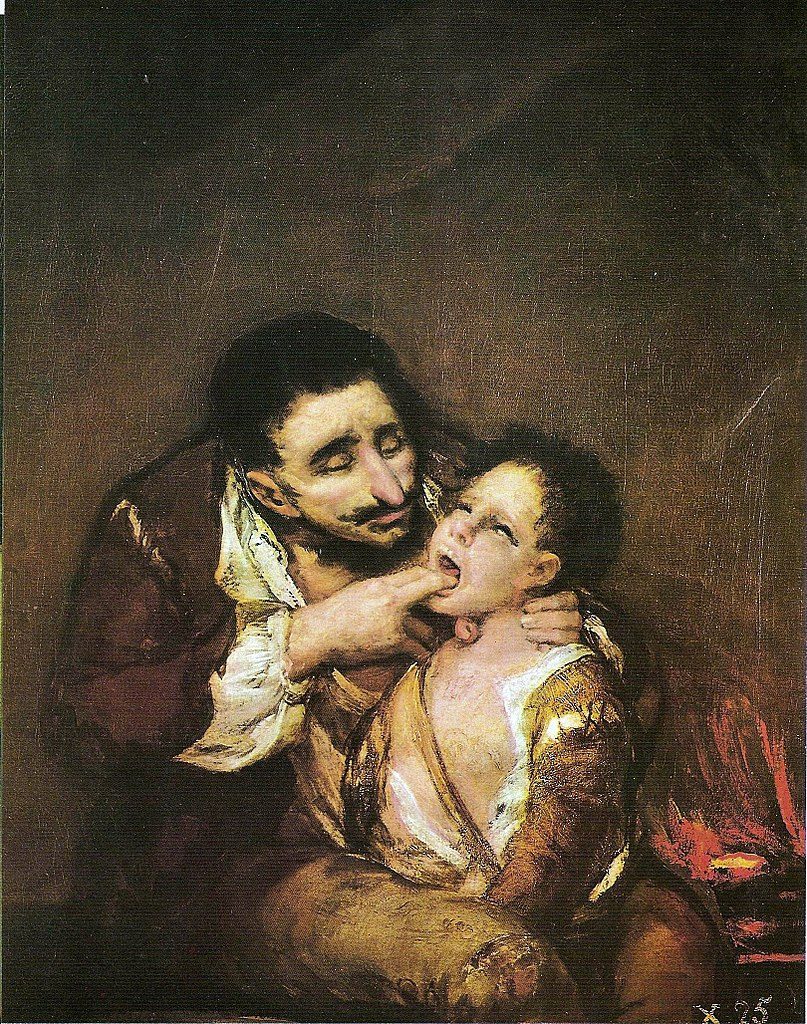
Wednesday
My sister-in-law Joyce Bates, beloved by her Clarksville third-graders, recently posted an inspiring quotation by L. R. Knost about how to raise kids. After reading it, I thought of the blind beggar in the Spanish picaresque novel Lazarillo de Tormes (1554), who ascribes to just the opposite philosophy.
The author of such books as The Gentle Parent and 2000 Kisses a Day writes,
It’s not our job to toughen our children up to face a cruel and heartless world. It’s our job to raise children who will make the world a little less cruel and heartless.
If only everyone ascribed to this philosophy! Young Lazaro, who loses first his father and then his mother to crime, gets a far different lesson from the old man to whom he is apprenticed. It’s literally the school of hard knocks:
We left Salamanca and we came to a bridge; and at the edge of this bridge there’s a stone statue of an animal that looks something like a bull. The blind man told me to go up next to the animal, and when I was there he said, “Lazaro, put your ear up next to this bull and you’ll hear a great sound inside of it.”
I put my ear next to it very simply, thinking he was telling the truth. And when he felt my head near the statue, he doubled up his fist and knocked my head into that devil of a bull so hard that I felt the pain from its horns for three days. And he said to me, “You fool, now learn that a blind man’s servant has to be one step ahead of the devil.” And he laughed out loud at his joke.
Lazarillo learns the intended lesson:
It seemed to me that at that very instant I woke up from my childlike simplicity and I said to myself, “He’s right. I’ve got to open my eyes and be on my guard. I’m alone now, and I’ve got to think about taking care of myself.”
In his subsequent time with the beggar, Lazaro learns how to cheat his skinflint master, who in turn beats him constantly. Finally, driven past endurance, Lazarillo gets his revenge. To escape a rainstorm, they must cross a ditch, and Lazaro finds a strategic place to jump:
It was really raining hard and the poor man was getting wet. This, along with the fact that we were in a hurry to get out of the water that was pouring down on us–and especially because God clouded his mind so I could get revenge–made him believe me, and he said, “Point me in the right direction, and you jump over the water.”
I put him right in front of the pillar. Then I jumped and got behind the post like someone waiting for a bull to charge, and I said to him, “Come on, jump as far as you can so you’ll miss the water.”
As soon as I’d said that, the poor blind man charged like an old goat. First he took one step back to get a running start, and then he hurled himself forward with all his might. His head hit the post with a hollow sound like a pumpkin. Then he fell over backward, half dead, with his head split open.
Lazaro goes on to live a life scamming people, including some miserly and corrupt clergymen, and the book ends with him describing his fake marriage to an archbishop’s mistress. (The novel Restoration features a similar cover-up.) Because of how it depicted clergy, the Spanish and Portuguese Inquisitions would ban Lazarillo de Tormes, but as the first picaresque novel it would go on to influence such works as Don Quixote, Moll Flanders, and Tom Jones.
Its lessons bring to mind a story about Don Trump, Jr., as reported by GQ:
Some paternal lessons have stuck with Don, who tries still to parse the old fatherly instruction for the faintest wisdom. For instance, a key Trump mantra, according to both Ivana and Don, neither of whom agreed to be interviewed for this story, was “Don’t trust anyone.” Trump would test his children on this maxim. “He’d say, ‘Do you trust me, your own father?’ ” Don once recalled. “We’d say, ‘Of course we do!’ And he’d say, ‘What did I just tell you? You didn’t take the lesson!’ It was certainly an interesting Trump moment,” Don continued, talking at a pressured, sober clip, “because it’s not something you’d see any conventional parent-child conversation go that way, especially not fully understanding what the concept of trust was.”
At least Don, Jr. didn’t get his head bashed in.
Lazaro’s blind teacher pays a heavy price for his philosophy of distrust, and we see the toll on America’s president in his raging paranoia. Whether there will be further penalties remains to be seen. For those raised in better circumstances than Lazaro, better the peace of mind that comes from trusting people than seeing all the world as out to get you.